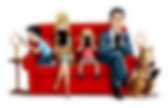

The Only Way is Ethics: #EDCMOOC Digital Artefact - The University of Nottingham - Mahara. How to read this artefactRead this column by column, from left to right.
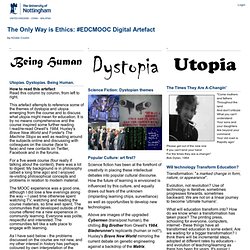
This artefact attempts to reference some of the themes of dystopia and utopia emerging from the course and to discuss what utopia might mean for education. It is by no means comprehensive and the course inspired some further reading. I read/re-read Orwell's 1984, Huxley's Brave New World and Forster's The Machine Stops as well as reading around the subjects online and discussing with colleagues on the course (face to face) and new contacts on Twitter, Facebook and in the forums. For a five week course (four really if talking about the content), there was a lot to digest. My background is in philosophy (albeit a long time ago) and I enjoyed re-visiting philosophical concepts and problems in relation to modern material. The MOOC experience was a good one, although I did lose a few evenings along the way -- I used time otherwise spent watching TV, watching and reading the course materials, so time well spent.
Keeley's EDCMOOC Personal Learning Network. Courses. Plus ca change … thoughts on a digital artefact #edcmooc « my learning journey. Posted on February 17, 2013 by Anne-Louise Robertson The way forward?
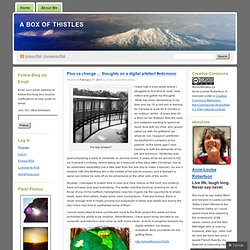
I have had a busy week where I struggled to find time to read, view, reflect and gather my thoughts. Our digital futures and the problem with metaphor. This post is a response to readings assigned in week 2 of the E-Learning and Digital Cultures MOOC (EDCMOOC).
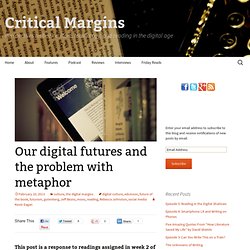
This week’s readings deal with technological metaphors and the ways in which they restrict our understanding of technology. Here, in my usual rambling way, I attempt to make connections between metaphor, analogy, and internet technology. Image Credit: Johan Larsson, flickr The goal of the first two weeks of EDCMOOC is to think about the effects of technology on digital culture. My MOOC Experience (#edcmooc) – Week Two. This week in eLearning and Digital Cultures was rather meta.
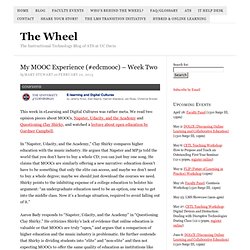
We read two opinion pieces about MOOCs, Napster, Udacity, and the Academy and Questioning Clay Shirky, and watched a lecture about open education by Gardner Campbell. In “Napster, Udacity, and the Academy,” Clay Shirky compares higher education with the music industry. He argues that Napster and MP3s told the world that you don’t have to buy a whole CD; you can just buy one song. He claims that MOOCs are similarly offering a new narrative: education doesn’t have to be something that only the elite can access, and maybe we don’t need to buy a whole degree; maybe we should just download the courses we need. Observing myself and MOOC activity. It has been 4+ weeks in #etmooc and 2+ for #edcmooc.

This is a note to myself – a think aloud about participation. In the end, I am trying to discover balance. What mix of activities works for me best a digital, connected learner? Poetry, Music, Sunrise, and Puppies: What Equilibrium Tells Us About Being Human #edcmooc « Amy's MOOCs: Professional Digi-velopment. When thinking of what it means to be “human”, I keep coming back to the 2002 Christian (love him!)
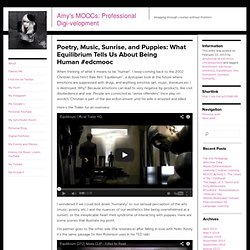
Bale film “Equilibrium”, a dystopian look at the future where emotions are suppressed with drugs, and anything emotive (art, music, literature,etc.) is destroyed. Why? Because emotions can lead to very negative by-products, like civil disobedience and war. People are convicted as “sense offenders” (nice play on words!). Christian is part of the law enforcement until his wife is arrested and killed. Here’s the Trailer for an overview: I wondered if we could boil down “humanity” to our sensual perception of the arts (music, poetry, etc.) and the nuances of our aesthetics (like being overwhelmed at a sunset), or the inexplicable heart melt syndrome of interacting with puppies. His partner goes to the other side (the resistance) after falling in love with Yeats (funny it’s the same passage Sir Ken Robinson uses in his TED talk)
Teaching 'E-learning and Digital Cultures' It seems clear that the Coursera forum tool was built to facilitate factual questions and answers, not conversations or connections.
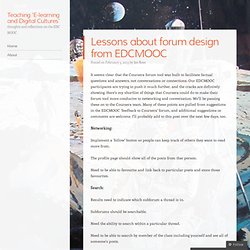
Our EDCMOOC participants are trying to push it much further, and the cracks are definitely showing. Here’s my shortlist of things that Coursera could do to make their forum tool more conducive to networking and conversation. We’ll be passing these on to the Coursera team. Many of these points are pulled from suggestions in the EDCMOOC ‘feedback to Coursera’ forum, and additional suggestions or comments are welcome. I’ll probably add to this post over the next few days, too. Networking: Implement a ‘follow’ button so people can keep track of others they want to read more from. The profile page should show all of the posts from that person.
First impressions about EDCMOOC (with some criticism) “E-Learning and digital cultures” is third course on Coursera for me.
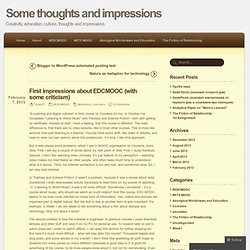
In October I’ve completed “Listening to World Music” and “Fantasy and Science Fiction”, both with getting an certificate. Already at start I have a feeling, that this course is different. The main difference is, that there are no video lectures, like in most other courses. Reflection on the ‘eLearning and Digital Cultures’ MOOC, Wk.2 #edcmooc. On to the second of the five weeks Coursera / University of Edinburgh MOOC: ‘eLearning and Digital Cultures’.
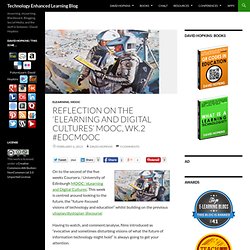
This week is centred around looking to the future, the “future-focused visions of technology and education” whilst building on the previous utopian/dystopian ‘discourse’. Having to watch, and comment/analyse, films introduced as “evocative and sometimes disturbing visions of what the future of information technology might hold” is always going to get your attention.
“Who is set to benefit from the personal, constant attentions of information technology, and who might lose out?” Isn’t this the question we ask, in one form or another, each time Apple releases a new device? Isn’t this what causes the backlash each and every time Facebook changes it’s privacy policy? How is education being visualised in “A Day Made of Glass”? YouTube: Sight YouTube: A Vision of Students Today “At the very least, the distinction is quickly growing irrelevant. Cadena. Design for Learning.